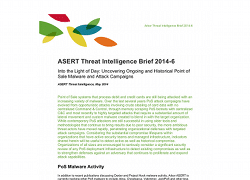The folks over at Smart Data Collective have an interesting story today on Big Data and its (expected) impact on a variety of industries and business practices. Fraud (and fraud detection), it turns out, may be one area that is transformed by better data analytics. According to the article, by Monte Zweben, fraud analytics are posed to be transformed not just by “Big Data,” but by better and faster analytics. The article looks at a variety of industries, including consumer marketing and logistics that stand to benefit from the growth in data and data analytics. Fraud detection is one of them. Zweben cites statistics on the growth of fraud as a global problem. Kroll’s most recent Global Fraud Report found the number of companies falling victim to fraud has increased to 70 per cent. Credit card companies were among the first to embrace “Big Dat” analytics to spot irregularities in patterns of charges […]
Banking
Survey: Consumers Growing Wary of Information Sharing
A survey by the business information service Lexis Nexis finds that consumers have grown more wary of programs that ask them to share data in exchange for improved services or other offerings. Editor’s note: LexisNexis has clarified that its survey was released in August, 2013, not October, 2013. The story has been corrected to reflect that information. – Paul 6/4/2014 The survey of 2,072 consumers, aged 21 to 74, was conducted in October 2013 by LexisNexis Risk Solutions. It found consumers were more wary of sharing information online, including at social networking and online banking sites than they were three years earlier. “Consumers are less comfortable with information sharing than three years ago,” the survey concluded. The survey was released in concert with Telematics Detroit 2014, a conference focused on information systems used in vehicles. It was designed to measure consumers’ awareness of- and interest in so-called “use based insurance” (or UBI) – sometimes referred […]
Unknown Knowns: Arbor Warns Of Widespread Point of Sale Compromises
The hack of U.S. retailer Target put attacks on point of sale systems on the radar, and prompted major retailers to revisit the security of the systems that accept credit card transactions. Now research from Arbor Networks is warning that hackers and cyber criminals are doubling down on point of sale (PoS) systems with a wide range of specialized PoS malware and targeted attacks. Arbor says it has data suggesting that PoS compromises may be widespread, and undetected. Arbor’s Security Engineering & Response Team (SERT) issued its findings in a Threat Intelligence Brief (2014-6) report. The company said that “ambitious threat actors” are using targeted attack campaigns against PoS networks. The “longevity and extent” of PoS attack campaigns – even at wealthy and sophisticated organizations – is “a serious concern.” [Read Security Ledger’s coverage of the Target data breach here.] “In organizations with security teams and well-managed network infrastructure, point of […]
Target Breach Spells End for Magnetic Stripe Cards in 2015
After years spent fighting pushes for more secure standards, the payment card industry and retailers are moving quickly to abandon magnetic stripe cards and embrace so-called ‘chip and pin’ technology. Credit card firms MasterCard and Visa plan to have most customers on the more secure chip and pin cards by October, 2015, according to a report in the Wall Street Journal. The move comes in the wake of a massive heist of account information for tens of millions of credit card holders from the systems of U.S. retailers including Target, Neiman Marcus and Michaels Stores. In an interview with MasterCard’s Carolyn Balfany, the Journal notes that company has set October, 2015 as the date for a “liability shift” – a change in policy that will hold the party in a fraudulent transaction liable for losses due to that transaction. The goal, said Balfany, is to try to encourage merchants and […]
BitCoin’s Popularity Is Undermining Promises of Anonymity
The virtual currency Bitcoin has soared in value against the U.S. dollar in recent months, topping out a staggering $913 USD to 1 Bitcoin (or BTC) as of late Tuesday. The currency had many ups and downs since it was launched in January 2009. But its main attraction, all along, has been anonymity. Unlike any other online payment system, Bitcoin transactions – like cash transactions – cannot be traced back to specific individuals. Also like cash, they cannot be reversed. Both those factors give Bitcoin users the confidence that their online purchasing activity – whether computer hardware or contraband will remain private. But a group of researchers at two U.S. universities have released a paper that suggests reports of Bitcoin’s anonymity may (to paraphrase Twain) “be greatly exaggerated.” Specifically: the researchers found that, by culling a variety of open source data using public data from the Bitcoin Peer to Peer network and from […]





